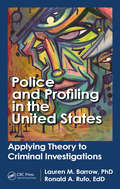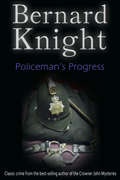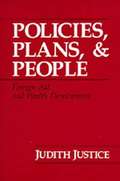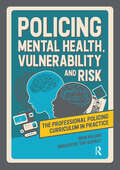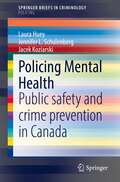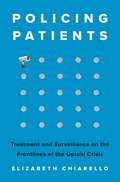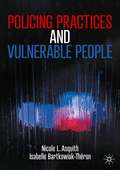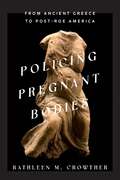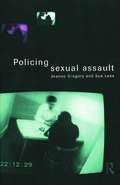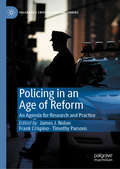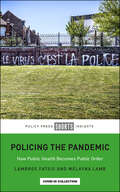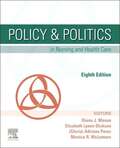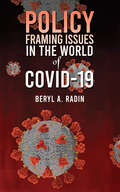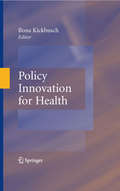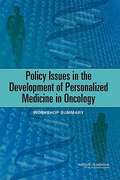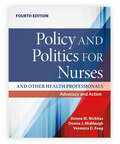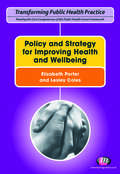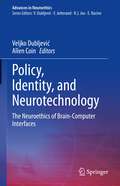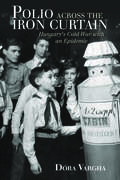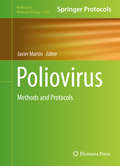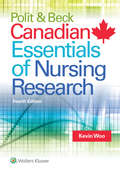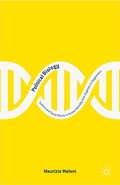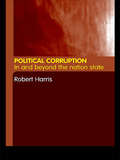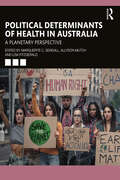- Table View
- List View
Police and Profiling in the United States: Applying Theory to Criminal Investigations
by Lauren M. Barrow Ron A. Rufo Saul ArambulaTraditionally, criminal profiling texts have focused on the technicalities of conducting an investigation, but recent developments in criminal justice have encouraged greater consideration of related fields. Highlighting the current paradigm shift in criminology towards a cross-disciplinary understanding of behavior, this book enables investigators to combine theory, instinct, and hunches with contemporary technology to construct a solid criminal profile. It examines theories on criminal behavior, describes how to develop typologies based on different criminal characteristics, examines the critical role of crime scenes, and concludes with scintillating profiles of 13 of the most notorious serial killers.
Policeman's Progress: The Sixties Crime Series (The\sixties Crime Ser. #5)
by Bernard KnightA classic murder mystery by acclaimed crime writer Bernard Knight.Jackie Stott, Tyneside boxer turned nightclub owner – and criminal – seeks to evade the Newcastle police as he stumbles from one dodgy deal to another.When Jackie gets involved in a murder, the police have a reason to try to get him locked up for good – and it’s not just the police who are out to get Jackie, for rival gangland figures are soon gunning for him too!A rip-roaring ride through the nightlife and criminal underworld of a bustling British city during the 1960s.
Policies, Plans, and People: Foreign Aid and Health Development
by Judith JusticeJudith Justice uses an interdisciplinary approach to show how anthropologists and planners can combine their expertise to make health care programs culturally compatible with the populations they serve.
Policing & Firearms: New Perspectives and Insights
by Richard Evans Clare FarmerPolicing and firearms: it is a crucial relationship. Should police be routinely armed? If so, what restrictions should be imposed on the use of firearms? Where police are not routinely armed, there is still a need for specialist armed police: how do these units operate, and are they effective?This ground-breaking edited book explores the nexus between policing and firearms with a genuinely international focus. Contributors from Ireland, Germany, the United Kingdom, Brazil, Mexico, the United States, Venezuela, New Zealand, Australia, and Canada explore the issues from a range of perspectives, including human rights, militarization, police legitimacy, and the risks police firearms pose to the community and to police themselves.This thought-provoking collection is an indispensable resource for law enforcement policymakers and students of policing and criminal justice.
Policing Mental Health, Vulnerability and Risk (The Professional Policing Curriculum in Practice)
by Brian WilliamsPart of the Professional Policing Curriculum in Practice series, this text covers the important contemporary topic of policing those who may have poor mental health are classed as vulnerable or at risk, which runs throughout the policing curriculum.It examines how policing has evolved when dealing with vulnerable people and covers situations such as county lines, modern slavery and online bullying and harassment. It emphasises the importance of the overall police response as part of a multi-agency approach and promotes the need for individual professional curiosity from police officers. Case studies add to the rich knowledge base provided, and critical questions and examples of evidence-based practice are included to embed understanding and help cement theory. Students will develop their critical thinking abilities and gain the confidence to recognise and deal with the complex issues associated with this topic.
Policing Mental Health: Public safety and crime prevention in Canada (SpringerBriefs in Criminology)
by Laura Huey Jennifer L. Schulenberg Jacek KoziarskiThis brief addresses the question of the various ways in which mental health-related issues have become police responsibility. It provides a detailed understanding of the myriad of ways in which police are often called upon to be the primary responder to mental health-related issues, well beyond the standard media images of individuals in extreme crisis. Drawing upon the results of two separate ethnographies of police practices in Canada, this volume examines how public policing has become entangled in cases of persons with mental illness (PMI). It examines two aspects of the police role and mandate that brings police officers into contact with individuals dealing with mental health disorders: public safety, and crime prevention and response. It explores police perceptions towards the roles they play in the lives of PMI, and police demands in these types of calls for service that have transformed aspects of public policing. Appropriate for policing researchers, law enforcement and public policymakers, this book presents the argument that tackling this matter requires knowledge of police involvement in situations with PMI, as well as a set of evidence-based policy options that will not generate additional resource or other strains.
Policing Patients: Treatment and Surveillance on the Frontlines of the Opioid Crisis
by Elizabeth ChiarelloA book that takes you inside the culture of surveillance that pits healthcare providers against their patientsDoctors and pharmacists make critical decisions every day about whether to dispense opioids that alleviate pain but fuel addiction. Faced with a drug crisis that has already claimed more than a million lives, legislatures, courts, and policymakers have enlisted the help of technology in the hopes of curtailing prescriptions and preventing deaths. This book reveals how this &“Trojan horse&” technology embeds the logics of surveillance in the practice of medicine, forcing care providers to police their patients while undermining public trust and doing untold damage to those at risk.Elizabeth Chiarello draws on hundreds of in-depth interviews with physicians, pharmacists, and enforcement agents across the United States to take readers to the frontlines of the opioid crisis, where medical providers must make difficult choices between treating and punishing the people in their care. States now employ prescription drug monitoring programs capable of tracking all controlled substances within a state and across state lines. Chiarello describes how the reliance on these databases blurs the line between medicine and criminal justice and pits pain sufferers against people with substance-use disorders in a zero-sum game.Shedding critical light on this brave new world of healthcare, Policing Patients urges medical providers to reaffirm their roles as healers and proposes invaluable policy solutions centered on treatment, prevention, and harm reduction.
Policing Practices and Vulnerable People
by Isabelle Bartkowiak-Théron Nicole L. AsquithThis textbook addresses existing gaps in police research, education, and training, and provides guidance on how to respond to and address the vulnerability that arises in policing practice. It guides students through the conceptual and also the practical issues of managing vulnerability in policing with case studies and practitioners’ views from the UK, Australia, New Zealand, South Africa, the US, Canada, France, and beyond to the Maldives, China, India, Pakistan, and Sri Lanka. It includes key concepts, views from the front-line, further reading and activities in each chapter. Policing Practices and Vulnerable People is aimed at researchers and practitioners working with police. While focussed on democratic policing practices, this book includes case studies and practitioners’ views from a wide range of approaches, including those from the Global South. This book provides readers with a framework that can assist them in converting conceptual knowledge to critical, ethical policing practice.
Policing Sexual Assault
by Jeanne Gregory Sue LeesPolicing Sexual Assault provides a detailed account of current police practice in the UK in response to sexual assault. The authors use case studies and interviews to find out why when the number of rape cases has almost trebled since 1985, the proportion of cases resulting in a conviction has dropped from 24% to 8.6%. Chapters cover: an overview of existing research police culture police recording practices the role of the Crime Prosecution Service male rape analysis of the judicial process interviews with complainants and first-hand accounts of their experiences proposals for reform. The authors place their findings within the context of theoretical debates about domestic and sexual violence and examine the gap between official condemnations of male violence, as enshrined in law, and the realities of the victims' (male and female) experiences - whereby the violence is too often condoned.
Policing in an Age of Reform: An Agenda for Research and Practice (Palgrave's Critical Policing Studies)
by Timothy Parsons James J. Nolan Frank CrispinoThis book tackles the contentious issue of policing in an age of controversy and uncertainty. It is a timely book written by police scholars — predominantly former practitioners from Europe, Australia and North America — who draw from their own research and operational experiences to illuminate key issues relating to police reform in the present day. While acknowledging some relevance of usual proposed models, such as problem-solving, evidence-based policing and procedural justice, the contributors provide an insider look at a variety of perspectives and approaches to police reform which have emerged in recent decades. It invites university students, criminologists, social scientists, police managers, forensic scientists to question and adapt their perspectives on a broad range of topics such as community policing, hate crime, Islamic radicalisation, neighborhood dynamics, situational policing, antidiscrimination and civil society, police ethics, performance measures, and advances in forensic science, technology, intelligence and more in an accessible and comprehensive manner.
Policing the Pandemic: How Public Health Becomes Public Order
by Lambros Fatsis Melayna LambThe COVID-19 pandemic has highlighted the inadequacies of the state’s response to public health and public order issues through deeply flawed legislation. Written in the context of the #BlackLivesMatter protests, this book explores why law enforcement responses to a public health emergency are prioritised over welfare provision and what this tells us about the state’s criminal justice institutions. Informing scholarly, civic and activist thinking on the political nature of policing, it reveals how increasing police powers disproportionately affects Black people and suggests alternative ways of designing public safety beyond a law enforcement context.
Policy And Politics In Nursing And Health Care
by Diana J. Mason Adrianna Perez Monica R. McLemore Elizabeth Lynne DicksonLearn how to influence policy and become a leader in today's changing health care environment. Featuring analysis of cutting-edge healthcare issues and first-person insights, Policy & Politics in Nursing and Health Care, 8th Edition continues to be the leading text on nursing action and activism. Approximately 150 expert contributors present a wide range of topics in policies and politics, providing a more complete background than can be found in any other policy textbook on the market. This expanded 8th edition helps you develop a global understanding of nursing leadership and political activism, as well as the complex business and financial issues that drive many actions in the health system. Discussions include the latest updates on conflict management, health economics, lobbying, the use of media, and working with communities for change. With these innovative insights and strategies, you will be prepared to play a leadership role in the four spheres in which nurses are politically active: the workplace, government, professional organizations, and the community.
Policy Framing Issues in the World of COVID-19
by Beryl A. RadinThis book is a somewhat unusual depiction of a difficult policy issue. It transcends almost all boundaries because of its constant change and its movement across many different participants.It was found attached to a range of policy topics, methodologies and approaches. Some of these were familiar while others seemed new. Interest in this topic was exhibited across the globe and did not appear to be delivered along with a narrow political agenda.While researchers tended to re-examine classic public policy literatures (such as those dealing with implementation, federalism and budgeting) they did so by raising unusual issues. But this was not typical since analysts are likely to emphasize similarities rather than differences in settings.
Policy Innovation for Health
by Ilona KickbuschThe facts are hard to ignore: rising rates of chronic disease, epidemic obesity and diabetes, a widening longevity gap between rich and poor, health care "reforms" at odds with patient interests. In response, Policy Innovations for Health argues that a nation's well-being mirrors the health of its citizens--and calls not only for improvement in our health care systems but for a complete reconceptualization of health and social policy, starting with expanded, interrelated roles for health care providers, consumers, and policymakers. The long-term strategies outlined in this book emphasize a stronger balance between public and individual health goals, and collaborations between cost-efficient, streamlined medical care and innovative therapeutic research and technology--values that have been traditionally been considered in conflict. Examples are included of new care models and groundbreaking programs from Canada, the EU, and Australia that bring together the community, consumer, governmental, and corporate sectors; bridge the gaps between prevention, health promotion, and practice; and improve core health determinants such as living conditions, education, and social supports. These social, political, medical, and technological advances, assert the authors, are crucial to meeting the challenges of the decades ahead. Among the topics covered: Health as a central economic and societal force. New directions in the monitoring of health and well-being. "Integrating Health in all Policies" programs and how they can be implemented. The democratization of health knowledge and the expanding role of patient participation. Closing the financial divide in public health priority-setting. Policy Innovations for Health adds important new voices to the health care debate, and its vision will inspire professionals in health policy, health administration, health economics, and global health, as well as graduate students planning to enter these rapidly changing fields.
Policy Issues in the Development of Personalized Medicine in Oncology: Workshop Summary
by Institute of Medicine of the National AcademiesOne of the challenges in treating cancer is the disease's complexity and variation among patients. Cancer manifests differently in each patient, so treatments that are effective in one patient may not be effective in another. As cancer care becomes more personalized, subpopulations of individuals will be given preventive or therapeutic interventions based on their susceptibility to a particular disease or their predicted response to a specific treatment. However, before the use of personalized cancer care can reach its full potential, the health care system must resolve a number of technological, regulatory, and reimbursement issues. To explore these policy challenges, the National Cancer Policy Forum held the workshop Policy Issues in the Development of Personalized Medicine in Oncology in June 2009. Experts provided presentations on the current state of personalized medicine technology, as well as issues in the validation of, regulation of, and reimbursement for the predictive tests that underpin personalized medicine. Participants discussed the obstacles and possible solutions to further developing and using personalized medicine technologies. This document summarizes the workshop.
Policy and Politics for Nurses and Other Health Professionals: Advocacy and Action
by Donna M. Nickitas Donna J. Middaugh Veronica FeegPolicy and Politics for Nurses and Other Health Professionals: Advocacy and Action, Fourth Edition reflects a well-honed vision of what nursing and health professionals need to know to both understand and influence modern health policy. The authors focus on the most relevant health policy issues while taking an interdisciplinary approach to create an understanding of healthcare practice and policy across interprofessional teams. Through their focus on relevant issues, the authors discuss how healthcare professionals can prepare themselves to engage in the economic, political, and policy dimensions of health care. The Fourth Edition has been carefully revised and updated to reflect essential shifts to improve health and public policy as well as dramatic improvements in health care cost, quality, reliability, and technology around public health and data infrastructure.
Policy and Strategy for Improving Health and Wellbeing (Transforming Public Health Practice Ser.)
by Elizabeth Porter Lesley ColesAs health policy at a national level has ever increasing impact on local health services, it is essential that public health students understand how the development and implementation of policy and strategy provide the framework for improving quality, innovation, productivity and prevention in the delivery of healthcare. The book is divided into two sections, with section one covering a strategic overview of national policies, and section two giving specific local implementation of policy examples to support section one. Case studies and examples will help the reader to understand the policy and strategy and to apply them to their local setting.
Policy, Identity, and Neurotechnology: The Neuroethics of Brain-Computer Interfaces (Advances in Neuroethics)
by Veljko Dubljević Allen CoinIn this volume the authors explore the landscape of thought on the ethical and policy implications of Brain Computer Interface (BCI) technology. BCI technology is a promising and rapidly advancing research area. Recent developments in the technology, based on animal and human studies, allow for the restoration and potential augmentation of faculties of perception and physical movement, and even the transfer of information between brains. Brain activity can be interpreted through both invasive and non-invasive monitoring devices, allowing for novel, therapeutic solutions for individuals with disabilities and for other non-medical applications. However, a number of ethical and policy issues have been identified from the use of BCI technology, with the potential for near-future advancements in the technology to raise unique new ethical and policy questions that society has never grappled with before. The volume has three parts: 1) Past, Present and Future of BCI technology, 2) Ethical and Philosophical Issues and 3) Legal and Policy Implications. The rich and detailed picture of the field of BCI ethics with contributors from various fields and backgrounds, from academia and from the commercial sphere may serve as an introductory textbook into the neuroethics of BCI, or as a resource for neuroscientists, engineers, and medical practitioners to gain additional insight into the ethical and policy implications of their work.
Polio Across the Iron Curtain: Hungary's Cold War with an Epidemic (Global Health Histories)
by Dóra VarghaBy the end of the 1950s, Hungary became an unlikely leader in what we now call global health. Only three years after Soviet tanks crushed the revolution of 1956, Hungary became one of the first countries to introduce the Sabin vaccine into its national vaccination programme. This immunization campaign was built on years of scientific collaboration between East and West, in which scientists, specimens, vaccines and iron lungs crossed over the Iron Curtain. Dóra Vargha uses a series of polio epidemics in communist Hungary to understand the response to a global public health emergency in the midst of the Cold War. She argues that despite the antagonistic international atmosphere of the 1950s, spaces of transnational corporation between blocs emerged to tackle a common health crisis. At the same time, she shows that epidemic concepts and policies were influenced by the very Cold War rhetoric that medical and political cooperation transcended. This title is also available as Open Access.
Poliovirus: Methods and Protocols (Methods in Molecular Biology #1387)
by Javier MartínThis volume describes the most common laboratory procedures for isolation, identification and characterization of polioviruses used in clinical and research laboratories. Written for the Methods in Molecular Biology series, chapters include introductions to their respective topics, lists of the necessary materials and reagents, step-by-step, readily reproducible laboratory protocols, and tips on troubleshooting and avoiding known pitfalls.Authoritative and practical, Poliovirus: Methods and Protocols aims to ensure successful results in the further study of this vital field.
Polit & Beck Canadian Essentials of Nursing Research
by Kevin WooAdvance your career in Canadian healthcare with a mastery of nursing research. Thoroughly updated to reflect today’s changing Canadian nursing field, the fourth edition of Canadian Essentials of Nursing Research guides you to enhanced nursing practice through confident interpretation and application of the latest evidence-based nursing research.
Political Biology: Science and Social Values in Human Heredity from Eugenics to Epigenetics
by M. MeloniThis book explores the socio-political implications of human heredity from the second half of the nineteenth century to the present postgenomic moment. It addresses three main phases in the politicization of heredity: the peak of radical eugenics (1900-1945), characterized by an aggressive ethos of supporting the transformation of human society via biological knowledge; the repositioning, after 1945, of biological thinking into a liberal-democratic, human rights framework; and the present postgenomic crisis in which the genome can no longer be understood as insulated from environmental signals. In Political Biology, Maurizio Meloni argues that thanks to the ascendancy of epigenetics we may be witnessing a return to soft heredity - the idea that these signals can cause changes in biology that are themselves transferable to succeeding generations. This book will be of great interest to scholars across science and technology studies, the philosophy and history of science, and political and social theory.
Political Corruption: In Beyond the Nation State
by Robert HarrisThis book, combining scholarship with readability, shows that political corruption must itself be analysed politically. Spectacularly corrupt politicians - the exception rather than the rule - are usually symptoms, not causes, and much political corruption is simply normal politics taken to excess. But in a world in which anti-corruption strategies themselves are often thinly disguised examples of political corruption, the ways in which political systems address their own corruption are as varied and fascinating in character as crucial to comprehend. A valuable read for anyone studying social science disciplines such as politics, international relations, sociology, anthropology, criminology and public policy. As well as the global community of anti-corruption activists, professional politicians, police, business people and lawyers.
Political Determinants of Health in Australia: A Planetary Perspective
by Lisa Fitzgerald Marguerite C. Sendall Allyson MutchExposing the explicit and implicit relationships between politics, political decisions, and public policy within a planetary perspective, this book focuses on the importance of the political environment as a determinant of population health outcomes.Political Determinants of Health in Australia brings together a team of experts in public health, health policy and planetary health in Australia to examine the political factors that determine population health outcomes. It takes a student-centred approach, explaining complex concepts in an interactive, engaging, and thought-provoking way within a logical, easy to navigate structure. Each chapter takes on key contemporary public health issues, such as family, work, diversity, housing, energy, education, food, and waste, examining it within the context of politics, policy, and health outcomes from a planetary perspective.There is a comprehensive suite of learning activities in each chapter, catering to diverse learning styles and prior knowledge to encourage critical thinking. An essential text for students of public health, health promotion, and health policy.
